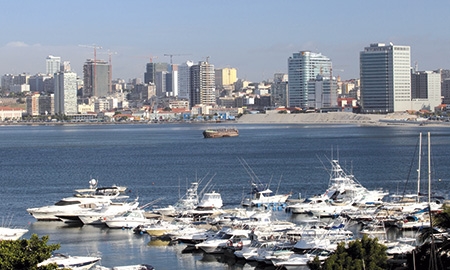Following an economic boom in the 2000s, Angola weathered the global financial storms of the last six years with remarkable resilience, currently maintaining inflation levels below 10%. Now the Angolan economy continues to expand, with an emphasis on diversifying in a nation that was once almost entirely dependent on oil extraction.
According to Jose Silva, Angola’s Minister of Urban Development and Housing, the economy has seen growth rates of around 10% in the last five years. And while the economy is still heavily reliant on the oil industry, the non-oil economy experienced growth rates around 9.2%. “We have a national development plan,” Mr. Silva says, which focuses on “the diversification of our economic structure.”
Angola was in desperate need of infrastructure to link provinces to the capital and to provide basic social services. Several companies have answered the call for these sorts of projects.
|
The plan will be enacted over the period 2013 - 2017. Mr. Silva says the emphasis would be on developing non-oil industries like agriculture and construction, among other services.
Indeed, Angola’s construction industry is quite literally paving the way for the nation’s economic advancement. Following the civil war, Angola was in desperate need of infrastructure to link provinces to the capital and to provide basic social services.
Several companies have answered the call for these sorts of projects and the jobs they create. Among them are Portuguese construction and industry giants,
Somague and Acail, two shining examples of what foreign investment can do in Angola, both for the country’s development and for a company’s bottom line.
Somague has had a working group in Angola for the last 10 years. Director General of Somague Angola Luis Gonçalves says that in 2004, Somague had a business portfolio of around $30 million. By the end of 2013, that figure had exploded by thirteen-fold, with Somague’s business portfolio coming in closer to $400 million less than ten years later.
Mr. Gonçalves said he is proud of how Somague achieved this level of financial success: by responding to the needs of Angola. “Of course, like every private enterprise you are in many ways judged on your profitability, but we have serious social responsibilities to the people and want to be part of the future of Angola,” he explains. “What has been done in these last 12 years of peace is really unbelievable. In Somague, we are well positioned to meet the real needs of the country.”
“We have a national development plan [which focuses on] the diversification of our economic structure.”
JOSE ANTONIO MARIA DA
CONCEIÇAO SILVA
Angola’s Minister of Urban Development and Housing
--------------------------------
“What has been done in these last 12 years of peace is really unbelievable. In Somague, we are well positioned to meet the real needs of the country.”
LUIS GONCALVES
Director General, Somague Angola
|
Somague has contributed to construction of the Luanda International Airport, many hospitals, and a university campus. It has also rebuilt several war-ravaged primary schools. “It is rewarding to know that we changed those communities for the better,” Mr. Gonçalves says. “Now all our attention is turned towards the basic infrastructure related to transportation, energy, public health, etc.”
Acail got started in Angola in 2005 and since then it has done considerable work to reconstruct infrastructure that was severely damaged during the war. This has included building bridges, hospitals, retail space, private homes and even the new National Assembly building. Not to forget the important contribution that Acail plays in the electrification of the country via its concrete posts for high and medium voltage electricity cables.
But construction is not the only thing Acail is suited for. As a company that provides a set of extremely diverse services, Acail in some ways reflects what the Angolan government hopes to see in its economy. The company serves clients ranging from Chevron to Coca Cola.
A key reason for Acail’s success in Angola comes down to training and employing local human capital. Of Acail Angola’s 140 employees, 114 are Angolan nationals. Mr. Gonçalves agrees that this is crucial. “Companies have to tap into the local workforce and true success will only be achieved when the core and central structure is Angolan,” he says. “Somague particularly invests heavily in the training of manpower because it is what gets us results.”
Despite tremendous opportunity in Angola, there are still setbacks for construction companies doing business there. Many building materials still are not manufactured in Angola, and so they have to be imported from other countries. This can take time. And yet, it seems improvements in infrastructure are also making that process less tedious. “Years ago we could take about three months to have the product delivered to Angola by sea,” Gonçalves said. “Today in 15 days we have the products.”
The constant need to import building materials also has an impact on cost, and contributes to Angola’s housing shortage. Mr. Silva acknowledged that this is a problem the country needs to tackle. He says that while there is a small industry for the production of building materials in Angola, “the truth is that it still cannot meet the demand presented by very large volumes of construction which turns out to be a big contributor to higher costs of construction.”
Mr. Gonçalves remains optimistic in light of his company’s success in Angola. “The country has everything needed to shine as a destination for growth and investment,” he says. “I encourage people to come and experience it for themselves.”

0 COMMENTS